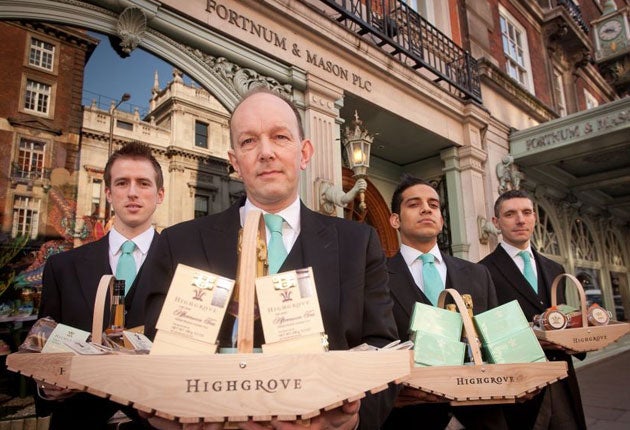
It happens every time we choose a supermarket to buy our groceries (Sainsbury’s or Asda); with each drink we order in the pub (Pimm’s or Bell’s); whenever we treat ourselves by buying something “posh” to eat (M&S salmon en croute), or conversely, if we swerve a chain viewed as “unhealthy” (Greggs, KFC).
Last week’s landmark survey published in The Independent on Sunday explored the attitudes of the 71 per cent of Britons who now view themselves as middle class. It highlighted how class is today defined not by the work we do, not only by education and income, but by what we consume. This isn’t just about whether or not one queued overnight for an iPad or drives a battered Land Rover. It concerns what we eat and drink – with cafetière coffee, rather than instant, in particular being a great marker of social station. In modern Britain, even food is class-bound. We of the middle class massive love nothing more than aspirational eating. You only need to listen to the arch critiques of Come Dine With Me contestants to see exactly how our food choices define us in the eyes of others.
The last few days have produced a feast of stories about status-bound snacks. Was there a media outlet in the land that did not refer to Fortnum & Mason, the site of a sit-in on Saturday by direct action group UKUncut, as the shop that sells “the Queen’s marmalade”?
This was valuable PR for the royal grocer, which most native Londoners regard as a tourist trap second only to Madame Tussauds. Everybody knows that the best orange marmalade is Tiptree (also the brand that actually holds the royal warrant for marmalade and jam, in case you care), which is available in supermarkets everywhere. No matter. Much of what Fortnum’s offer may be very fine, but its image isn’t really built on gourmet credentials. What it actually sells, as evidenced by the wall-to-wall coats of arms and “By Royal Appointment” slogans in-store, is an idea of class. Indeed, the handbook given to all 800 companies that hold warrants to supply the British Royal Family is called “A peerage for the trade”.
Yet even hardened republicans can’t resist buying. Marie Antoinette’s most famous utterance has been taken to heart in this country: yes, please, we will eat your cake – and pay a premium for it, too! With winsome little pictures of stately homes, walled gardens and nonsense historical backstories on labelling, the marketing of posh food products is social fantasy we all indulge in. Prince Charles famously cut out the middle-merchant and his Duchy Originals brand flogs decent (although not always outstanding) biscuits, bacon and mince pies in aristocratic packaging that panders to our deeply ingrained aspirations.
But what happens when a blue blood reveals that for his nuptials, he’d really like nothing more than a McVitie’s chocolate biscuit fridge cake? How can we square Prince William’s (ironic?) taste for such a déclassé sickly-sweet confection with the common assumption that posh food is best?
And then there’s Kate Middleton’s choice of maker for “her” traditional fruit cake – made by a baker of “supermarket cakes”, so the horrified food snobs have it. The idea that royal patronage guarantees supreme quality is a confection by the marketing men and, in fact, that little golden coat of arms on the label is a guarantee merely of safeness, nothing more. Eating something because the Queen likes it is an activity best left to the tourists.
Daylight’s power to make us feel good
This isn’t quite a paean to the joys of springtime, but still – what a difference an hour makes. A whole 60 minutes of daylight in the early evening is an instant feel-good hit, and I defy anyone not to feel slightly lighter of step. I won’t bore you by rehearsing the arguments for having that extra hour of BST all year round, for who can blame Scotland for not wanting to be plunged into darkness for half the year? But this week is a lovely, transformational time when even grimy London looks re-made, inspiring us to crawl out of our wintry carapaces and embrace the longer evenings. Now, to make sure that I do something really constructive with that precious hour and don’t simply spend it standing outside a pub …
I need a guide to the etiquette of concert-going
Traversing the no-man’s land between youth and middle age, sometimes one needs a bit of guidance. I’m new to applying anti-ageing eye cream, visiting garden centres on a Sunday morning and attending classical music concerts. On the latter point in particular, I am confounded by where, exactly, I am supposed to focus my visual attention during the performance. The conductor? Some point in the middle distance? The orchestra? And if so – which section?
I never remember this being a problem in gig-going days: I just drank a double-vodka tonic and gazed at the most beautiful man on the stage (there was always one), or, failing that, the dancing or costumes or even the mosh pit. But this classical-music novice was having serious difficulties one night last week watching the BBC Symphony Orchestra at the Barbican. The music – Rachmaninov – sounded incredible, but concentrating on it was nearly impossible.
Then I read that the architect Frank Gehry might have a radical solution for people like me who crave a focal point; at his newly inaugurated concert hall for the New World Symphony in Miami, Florida, film is projected on to swooping, sail-shaped screens above the orchestra, complementing the aural experience. Traditionalists will hate it, but I think I’ve seen the future.
Join our commenting forum
Join thought-provoking conversations, follow other Independent readers and see their replies
Comments